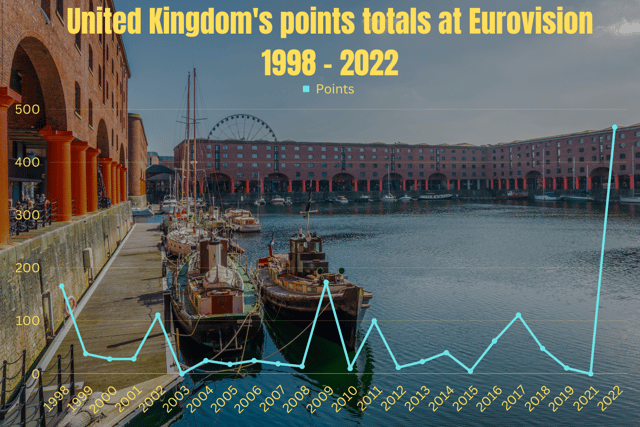Eurovision 2023; will Mae Muller continue Sam Ryder’s high placing? A brief history of the UK at Eurovision
People in this article
and live on Freeview channel 276
Tonight is the night; after months of preparation and two semi-finals now done and dusted, Liverpool throws open its doors to the world with the Eurovision Song Contest grand final, screening live on BBC One, BBC iPlayer, BBC Radio 2 and BBC Sounds. Though as of writing the two bookies favourites are Sweden and Finland (continuing a long trope of Scandinavian countries dominating the history of the event), all hopes in the United Kingdom rest on Mae Muller and her catchy track “I Wrote A Song.”
Having undertaken a media blitz in the lead up to the event, we’ve gotten very serious Sam Ryder vibes with Muller’s approach to the contest; having fun, being hospitable and, from interviews after Eurovision 2022, being one of the more sociable members of the contest. But none of that matters once the phone polls open and the public vote is concluded.
Advertisement
Hide AdAdvertisement
Hide AdSo what’s the likelihood that the United Kingdom pick up their first Eurovision victory since Katrina and The Waves back in 2017? Well the bad news is that William Hill has put the United Kingdom’s odds at 33/1, but the good news is that we know how unpredictable Eurovision can be… except for certain countries always voting for one another (you know who you are.)
But anything second place or above would prove another great outing for the United Kingdom, given a recent history of placing very low or the dreaded “nil point” that has befallen the country five times since that 1997 victory (excluding the COVID-19 affected 2020 edition of the contest.)
So how have the United Kingdom fared since Katrina and The Waves ensured Birmingham would host the 1998 iteration of the song contest? Let’s take a look at the graph, shall we?
United Kingdom’s Eurovision placings since 1997


Since Katrina and The Waves' victory in 1997, only three UK entrants have finished in the top five position; Imaani in 1998, Jessica Garlick in 2002 and Sam Ryder in 2022. The last placings sadly outnumber those victories though, with the United Kingdom finishing in last place five times, with two of those occasions seeing the country hit with the dreaded “nil points” - James Newman in 2021 (who took it on the chin like a champion during the grand final) and Jemini in 2003 (with that pitch-deaf, technical issues riddled entry “Cry Baby.” Apt.)
Advertisement
Hide AdAdvertisement
Hide AdThose big victories however all have one thing in common; they managed to earn over 150 points in the early stages of the voting. Anything above 200 points seems to be the golden ratio for a successful Eurovision campaign since its expansion in the late ‘00s, though nothing is guaranteed when the popular vote is counted.
Comment Guidelines
National World encourages reader discussion on our stories. User feedback, insights and back-and-forth exchanges add a rich layer of context to reporting. Please review our Community Guidelines before commenting.
